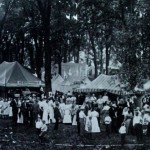The turn-of-the-century phenomenon known as Chautauqua was uniquely American in its blend of religion and entertainment, politics and culture, and the bucolic enjoyment provided by the booming railroad industry. The Winona Lake Chautauqua was no exception. The resort just south of Warsaw, Indiana was eclectic from the start. On land near an Indian burial ground at what was then called Eagle Lake, the Beyer Brothers purchased and platted a 100-acre tract to set up a dairy in 1881.
The area’s springs offered natural refrigeration for their products, and business flourished. As traffic to the area increased, Eagle Lake became a tourist destination. Spring Fountain Park, as it was christened, boasted a roller coaster, cycloramas illustrating both the life of Christ and Civil War battles, a race track, and the Eagle Lake Hotel, counted among Indiana’s finest.
The amusement park, however, was only a preamble to the resort’s golden age. In 1894, Presbyterian elder Dr. Solomon Dickey purchased the property to serve as the grounds for the Winona Bible Conference and Summer School, which began the following summer. A fence with a turnstile was constructed around the town, and admission charged for the six-week season of education, entertainment and recreation. The Pennsylvania Railroad shuttled visitors to the resort until discontinuing service in 1902; the following year the assembly’s directors developed the Winona Interurban Electric Line to fill in the breech. The light rail service eventually extended to Goshen in the north and Peru in the South.
At its height, the Chautauqua sustained five separate schools, three luxury hotels, steamboat cruises for 150 around the lake, and an annual Venetian Night, with decorated boats on the canals. Attendance peaked at 250,000 visitors a season. Famed orator William Jennings Bryan not only included Winona on his circuit, but served as the assembly’s president for two years. Humorist Will Rogers graced the stage of the Winona Chautauqua, as did Arctic explorer Admiral Richard E. Byrd, opera star Amelita Galli-Curci and violin virtuoso Efrem Zimbalist.
Ketchup magnate H.J. Heinz directed the assembly at one point; John M. Studebaker, the carriage and automobile manufacturer, at another. A name synonymous with Winona Lake is Billy Sunday–the nation’s first celebrity evangelist–who made his home there from the turn of the century until his death in 1935. Soon thereafter, the assembly’s summer programs were discontinued for lack of funding, although Winona Lake continued to serve as a hub for religious groups for decades.
For more information on Winona Lake, go to https://www.countyhistory.com/kosciusko/start.html






















